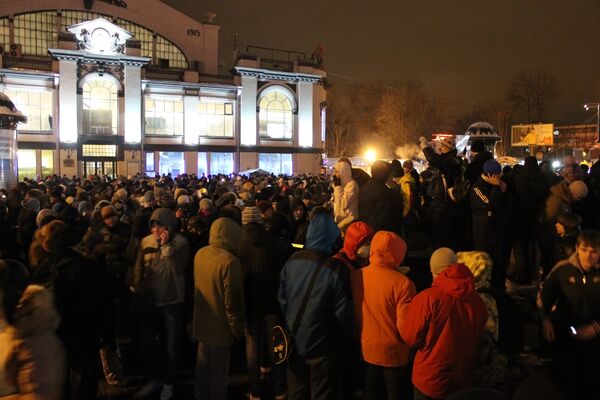Authorized and unauthorized protests in dozens of Russian cities, in which at least 60,000 people across the country are estimated to have taken part, were largely peaceful.
"According to the Interior Ministry's emergency response center, unauthorized protests were held in a number of Russian regions. During most of them, protestors left the area after warnings by police that their actions were against the law," a ministry spokesman said.
Demonstrations against alleged electoral fraud in favor of the ruling United Russia took place across the country, from the European exclave of Kaliningrad to Vladivostok on the Pacific coast. Organizers say the protests may continue next weekend and on December 24-25.
United Russia saw its share of the vote fall sharply in the December 4 polls, although it just managed to hang onto its parliamentary majority. But opposition activists claim the party's real figures were much lower.
The Organization for Security and Cooperation in Europe said the election was marked by a "lack of fairness" and "slanted" in favor of United Russia. The Russian electoral commission has said the vote was fair and valid, though President Dmitry Medvedev has said accusations of cheating must be investigated.
The largest rallies to demand a rerun of last weekend's parliamentary polls and vent anger at Prime Minister Vladimir Putin and his United Russia party were held in Moscow (police say 25,000, organizers claim many more), St. Petersburg (7,000) and Novosibirsk (3,000).
A spokesman for St. Petersburg police department said a rally in the city "ended without serious incidents". About 10 people were detained during the sanctioned rally at Pionerskaya Square. Later, police detained 20 out of some 50 protestors who gathered for an unauthorized event at Senatskaya Square.
No arrests were reported in Russia's third largest city, Novosibirsk, although the event gathered three times more than it was previously expected.
From 1,000 to 1,500 people are estimated to have taken part in protests in four major regional centers. In the Siberian city of Tomsk and Chelyabinsk in the Urals the rallies were authorized and no arrests or violence took place. No arrests were also made during an unsanctioned rally in southwest Siberia's Omsk. In the Urals city of Yekaterinburg, where 100 people attended a sanctioned rally and ten times more gathered for an unauthorized event, 20 people were detained but released shortly after, according to police sources.
In the Far Eastern city of Khabarovsk, police detained 38 people of about six dozen who gathered for an unauthorized rally.
Some 15 people were detained in the Urals city of Perm and about 35 during an unsanctioned rally in Syktyvkar west of Urals. Arrests were also made at an unauthorized rally in South Russia's Pyatigorsk.
In Kazan, the capital of the Volga Republic of Tatarstan, police surrounded people who gathered for an unsanctioned protest and asked them to leave. They started to disperse the rally only 2.5 hours later and a dozen protestors were detained.
Regional media say protests in other cities went of peacefully, and in the central Russian city of Voronezh police and protestors even shook hands with each other after the rally was over.


